[slingshot_ad name=”Slingshot Banner Ad”]
Need to know: Monday, June 27, 2016

Pope says church should ask forgiveness from gays for past treatment
The pontiff included treatment of women, praise for weapons and neglect of child labor on his list of issues worthy of an apology.

Evangelicals and refugees: Care first, conversion maybe later
Although evangelism is the lifeblood of evangelical Christians, some say care comes first.

Is Donald Trump now a born-again Christian?
Donald Trump recently accepted Jesus Christ as his Savior, making him a ‘baby Christian,’ Focus on the Family founder James Dobson reportedly said.
Fake monks? Buddhist leaders warn NYC tourists to be wary
Men in orange robes claiming to be Thai Buddhist monks are approaching visitors to some of the city's most popular attractions, asking for donations.
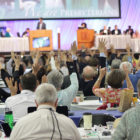
Presbyterians vote to continue pressure on Israel
Both Presbyterians and Unitarian Universalists considered resolutions this weekend aimed to pressure Israel to leave Palestinian lands.
[slingshot_ad name=”Slingshot Middle Cube Ad”]
Latest news from RNS

‘Free State of Jones’ is a movie based on the Bible as well as history
(RNS) Matthew McConaughey stars as a rebel among Civil War rebels who was inspired by scripture but who was not exactly a saint.

Vatican hits back at Turkey for calling pope ‘crusader’
(Reuters) The Vatican hit back on Sunday (June 26) at Turkey's depiction of Pope Francis as having a 'crusader mentality' after he used the word genocide to describe the massacre of 1.5 million Armenians a century ago.
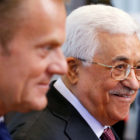
Palestinian leader retracts rabbis water poisoning allegation
(Reuters) Palestinian President Mahmoud Abbas retracted his allegation that Israeli rabbis had called for the poisoning of Palestinian water

Pope urges Armenia and Turkey to reconcile, shun vengeance
(Reuters) Visibly moved, Pope Francis took part in a prayer service along with President Serzh Sarksyan and leaders of the Armenian Apostolic Church while in Armenia.
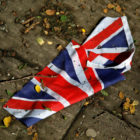
Brexit victory prompts prayers amid economic, political turmoil
(RNS) While backers of Britain's exodus from the European Union celebrated, faith leaders focused on the vote's impact on society's most vulnerable.
More views from RNS

LGBT — and free
One of my favorite high school teachers died. Here is what we didn't know — or thought we didn't know.
The cost of hate vs. the healing of authentic dealings
[caption id="attachment_582392" align="aligncenter" width="771"]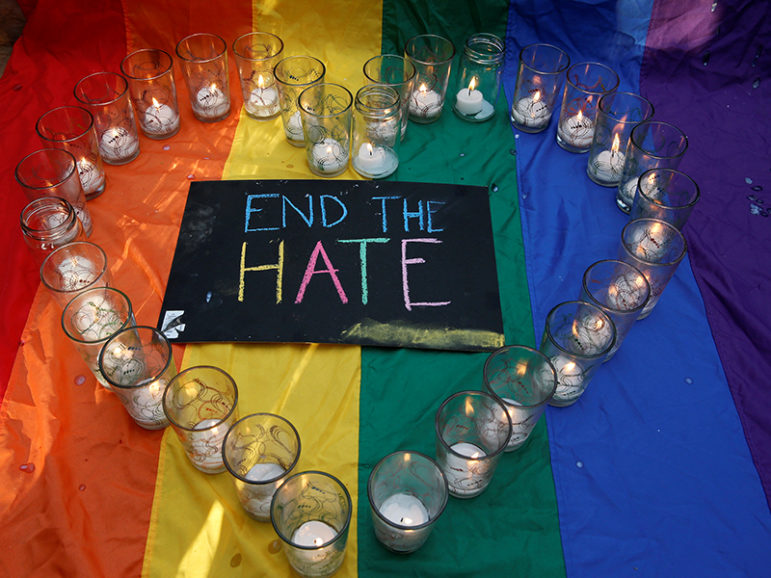 University of the Philippines students display glasses with lit candles and a placard as a tribute to those killed in the Pulse nightclub mass shooting in Orlando, Fla., during a protest at the school campus in Quezon city, Metro Manila, on June 14, 2016. Photo courtesy of REUTERS/Erik De Castro[/caption]
Three week-end stories about mass murders help frame crisis issues. The first recalls the murders of nine blacks in and during church in Charleston, South Carolina, exactly one year ago by a white supremacist. (New York Times, June 16). The same paper, the same day, front page, dealt with “Young New York Muslims, Robbed of a Respite” because of anti-Muslim speech and actions after the mass murder in Orlando. The third, same day, in the Wall Street Journal, dealt with “Orlando Shooting Leaves Gay Survivors, Mourning Families Struggling with Secrets,” also by reference to the Orlando killings.
Reporters, commentators, and the people they quote, reach for some reflections by others to guide their own. Mine were evoked by a sixty-year old (in my mind, classic) work on The Functions of Social Conflict, by Lewis Coser, who was commenting on still older work by German sociologist Georg Simmel. I have long and often used it to make sense of those who try to make sense of the Orlando killer and his mad motivations.
People ask: Was he prompted by hatred of Muslims, since he quoted Islamic themes, or by hatred, perhaps mixed with self-hatred, of gays? Answer: yes. Both. What psychologists and, in this case, theologians and pastors alike are pondering: What is the root of the killing actions? Answer: hatred, of course, but we have to say a bit more than that. So I reread lines from Coser, imprinted on my mind.
He quotes Else Frenkel-Brunswick on “the ethnocentric personality” of a hater: “even his hate is mobile and can be directed from one object to another.” And John Dewey: that people “do not shoot because targets exist, but they set up targets in order that throwing and shooting may be more effective and significant.” These killers set up blacks or Muslims or gays etc. etc. to convert their killing instincts into what they expect will be “effective and significant action.”
There is more, of course. In all cases, they had to turn those near to them into strangers—Simmel was savvy about that, too. Religious texts often deal with the subject; the Hebrew Bible and the New Testament Gospels, for instance, spend far more energy on how to have positive approaches to the stranger than to the neighbor or family-member.
Haters either have to keep on finding new strangers to be “set up as targets,” or they have to convert those close-by into strangers. And those who turn out to be strangers demand new appraisals. In the biblical texts (and not in them alone), the means and the goal are to break down barriers—often based on ignorance—and to inspire love and care.
Here is where the Wall Street Journal comes in. Jennifer Levitz and Cameron McWhirter focus on families struggling with secrets in the aftermath of the Orlando murders. These authors describe mourners, this time pictured in prayer, at worship, during commemorations, who found out only after their son or brother or sister died that their relative was gay “with Secrets.” The now-deceased could not share profound aspects of their lives full of joys and struggles with those closest to them—usually because these family members, often on religious grounds, would have rejected them or, in terms used by the WSJ column, would have hated them.
Many of the week’s stories reflected positively on religious counselors and other leaders who have used the occasion to learn and teach more about the costs of hate and about the healing that comes with knowledge, honesty, plus frank and open dealing with the humans in front of them, and not the “targets” they set up. Whites and blacks, gays and straights, the pious and impious, Christians and Muslims, have their work cut out for them, but, at best, these new occasions can inspire them to seek and put to work new resources for dealing with them.
University of the Philippines students display glasses with lit candles and a placard as a tribute to those killed in the Pulse nightclub mass shooting in Orlando, Fla., during a protest at the school campus in Quezon city, Metro Manila, on June 14, 2016. Photo courtesy of REUTERS/Erik De Castro[/caption]
Three week-end stories about mass murders help frame crisis issues. The first recalls the murders of nine blacks in and during church in Charleston, South Carolina, exactly one year ago by a white supremacist. (New York Times, June 16). The same paper, the same day, front page, dealt with “Young New York Muslims, Robbed of a Respite” because of anti-Muslim speech and actions after the mass murder in Orlando. The third, same day, in the Wall Street Journal, dealt with “Orlando Shooting Leaves Gay Survivors, Mourning Families Struggling with Secrets,” also by reference to the Orlando killings.
Reporters, commentators, and the people they quote, reach for some reflections by others to guide their own. Mine were evoked by a sixty-year old (in my mind, classic) work on The Functions of Social Conflict, by Lewis Coser, who was commenting on still older work by German sociologist Georg Simmel. I have long and often used it to make sense of those who try to make sense of the Orlando killer and his mad motivations.
People ask: Was he prompted by hatred of Muslims, since he quoted Islamic themes, or by hatred, perhaps mixed with self-hatred, of gays? Answer: yes. Both. What psychologists and, in this case, theologians and pastors alike are pondering: What is the root of the killing actions? Answer: hatred, of course, but we have to say a bit more than that. So I reread lines from Coser, imprinted on my mind.
He quotes Else Frenkel-Brunswick on “the ethnocentric personality” of a hater: “even his hate is mobile and can be directed from one object to another.” And John Dewey: that people “do not shoot because targets exist, but they set up targets in order that throwing and shooting may be more effective and significant.” These killers set up blacks or Muslims or gays etc. etc. to convert their killing instincts into what they expect will be “effective and significant action.”
There is more, of course. In all cases, they had to turn those near to them into strangers—Simmel was savvy about that, too. Religious texts often deal with the subject; the Hebrew Bible and the New Testament Gospels, for instance, spend far more energy on how to have positive approaches to the stranger than to the neighbor or family-member.
Haters either have to keep on finding new strangers to be “set up as targets,” or they have to convert those close-by into strangers. And those who turn out to be strangers demand new appraisals. In the biblical texts (and not in them alone), the means and the goal are to break down barriers—often based on ignorance—and to inspire love and care.
Here is where the Wall Street Journal comes in. Jennifer Levitz and Cameron McWhirter focus on families struggling with secrets in the aftermath of the Orlando murders. These authors describe mourners, this time pictured in prayer, at worship, during commemorations, who found out only after their son or brother or sister died that their relative was gay “with Secrets.” The now-deceased could not share profound aspects of their lives full of joys and struggles with those closest to them—usually because these family members, often on religious grounds, would have rejected them or, in terms used by the WSJ column, would have hated them.
Many of the week’s stories reflected positively on religious counselors and other leaders who have used the occasion to learn and teach more about the costs of hate and about the healing that comes with knowledge, honesty, plus frank and open dealing with the humans in front of them, and not the “targets” they set up. Whites and blacks, gays and straights, the pious and impious, Christians and Muslims, have their work cut out for them, but, at best, these new occasions can inspire them to seek and put to work new resources for dealing with them.
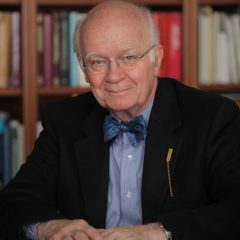 Author, Martin E. Marty, is the Fairfax M. Cone Distinguished Service Professor Emeritus of the History of Modern Christianity at the University of Chicago Divinity School. His biography, publications, and contact information can be found at www.memarty.com.
This post appears courtesy of Sightings, a publication of the University of Chicago Divinity School's Martin Marty Center.
To read previous issues of Sightings, click here.
Author, Martin E. Marty, is the Fairfax M. Cone Distinguished Service Professor Emeritus of the History of Modern Christianity at the University of Chicago Divinity School. His biography, publications, and contact information can be found at www.memarty.com.
This post appears courtesy of Sightings, a publication of the University of Chicago Divinity School's Martin Marty Center.
To read previous issues of Sightings, click here.
 University of the Philippines students display glasses with lit candles and a placard as a tribute to those killed in the Pulse nightclub mass shooting in Orlando, Fla., during a protest at the school campus in Quezon city, Metro Manila, on June 14, 2016. Photo courtesy of REUTERS/Erik De Castro[/caption]
Three week-end stories about mass murders help frame crisis issues. The first recalls the murders of nine blacks in and during church in Charleston, South Carolina, exactly one year ago by a white supremacist. (New York Times, June 16). The same paper, the same day, front page, dealt with “Young New York Muslims, Robbed of a Respite” because of anti-Muslim speech and actions after the mass murder in Orlando. The third, same day, in the Wall Street Journal, dealt with “Orlando Shooting Leaves Gay Survivors, Mourning Families Struggling with Secrets,” also by reference to the Orlando killings.
Reporters, commentators, and the people they quote, reach for some reflections by others to guide their own. Mine were evoked by a sixty-year old (in my mind, classic) work on The Functions of Social Conflict, by Lewis Coser, who was commenting on still older work by German sociologist Georg Simmel. I have long and often used it to make sense of those who try to make sense of the Orlando killer and his mad motivations.
People ask: Was he prompted by hatred of Muslims, since he quoted Islamic themes, or by hatred, perhaps mixed with self-hatred, of gays? Answer: yes. Both. What psychologists and, in this case, theologians and pastors alike are pondering: What is the root of the killing actions? Answer: hatred, of course, but we have to say a bit more than that. So I reread lines from Coser, imprinted on my mind.
He quotes Else Frenkel-Brunswick on “the ethnocentric personality” of a hater: “even his hate is mobile and can be directed from one object to another.” And John Dewey: that people “do not shoot because targets exist, but they set up targets in order that throwing and shooting may be more effective and significant.” These killers set up blacks or Muslims or gays etc. etc. to convert their killing instincts into what they expect will be “effective and significant action.”
There is more, of course. In all cases, they had to turn those near to them into strangers—Simmel was savvy about that, too. Religious texts often deal with the subject; the Hebrew Bible and the New Testament Gospels, for instance, spend far more energy on how to have positive approaches to the stranger than to the neighbor or family-member.
Haters either have to keep on finding new strangers to be “set up as targets,” or they have to convert those close-by into strangers. And those who turn out to be strangers demand new appraisals. In the biblical texts (and not in them alone), the means and the goal are to break down barriers—often based on ignorance—and to inspire love and care.
Here is where the Wall Street Journal comes in. Jennifer Levitz and Cameron McWhirter focus on families struggling with secrets in the aftermath of the Orlando murders. These authors describe mourners, this time pictured in prayer, at worship, during commemorations, who found out only after their son or brother or sister died that their relative was gay “with Secrets.” The now-deceased could not share profound aspects of their lives full of joys and struggles with those closest to them—usually because these family members, often on religious grounds, would have rejected them or, in terms used by the WSJ column, would have hated them.
Many of the week’s stories reflected positively on religious counselors and other leaders who have used the occasion to learn and teach more about the costs of hate and about the healing that comes with knowledge, honesty, plus frank and open dealing with the humans in front of them, and not the “targets” they set up. Whites and blacks, gays and straights, the pious and impious, Christians and Muslims, have their work cut out for them, but, at best, these new occasions can inspire them to seek and put to work new resources for dealing with them.
University of the Philippines students display glasses with lit candles and a placard as a tribute to those killed in the Pulse nightclub mass shooting in Orlando, Fla., during a protest at the school campus in Quezon city, Metro Manila, on June 14, 2016. Photo courtesy of REUTERS/Erik De Castro[/caption]
Three week-end stories about mass murders help frame crisis issues. The first recalls the murders of nine blacks in and during church in Charleston, South Carolina, exactly one year ago by a white supremacist. (New York Times, June 16). The same paper, the same day, front page, dealt with “Young New York Muslims, Robbed of a Respite” because of anti-Muslim speech and actions after the mass murder in Orlando. The third, same day, in the Wall Street Journal, dealt with “Orlando Shooting Leaves Gay Survivors, Mourning Families Struggling with Secrets,” also by reference to the Orlando killings.
Reporters, commentators, and the people they quote, reach for some reflections by others to guide their own. Mine were evoked by a sixty-year old (in my mind, classic) work on The Functions of Social Conflict, by Lewis Coser, who was commenting on still older work by German sociologist Georg Simmel. I have long and often used it to make sense of those who try to make sense of the Orlando killer and his mad motivations.
People ask: Was he prompted by hatred of Muslims, since he quoted Islamic themes, or by hatred, perhaps mixed with self-hatred, of gays? Answer: yes. Both. What psychologists and, in this case, theologians and pastors alike are pondering: What is the root of the killing actions? Answer: hatred, of course, but we have to say a bit more than that. So I reread lines from Coser, imprinted on my mind.
He quotes Else Frenkel-Brunswick on “the ethnocentric personality” of a hater: “even his hate is mobile and can be directed from one object to another.” And John Dewey: that people “do not shoot because targets exist, but they set up targets in order that throwing and shooting may be more effective and significant.” These killers set up blacks or Muslims or gays etc. etc. to convert their killing instincts into what they expect will be “effective and significant action.”
There is more, of course. In all cases, they had to turn those near to them into strangers—Simmel was savvy about that, too. Religious texts often deal with the subject; the Hebrew Bible and the New Testament Gospels, for instance, spend far more energy on how to have positive approaches to the stranger than to the neighbor or family-member.
Haters either have to keep on finding new strangers to be “set up as targets,” or they have to convert those close-by into strangers. And those who turn out to be strangers demand new appraisals. In the biblical texts (and not in them alone), the means and the goal are to break down barriers—often based on ignorance—and to inspire love and care.
Here is where the Wall Street Journal comes in. Jennifer Levitz and Cameron McWhirter focus on families struggling with secrets in the aftermath of the Orlando murders. These authors describe mourners, this time pictured in prayer, at worship, during commemorations, who found out only after their son or brother or sister died that their relative was gay “with Secrets.” The now-deceased could not share profound aspects of their lives full of joys and struggles with those closest to them—usually because these family members, often on religious grounds, would have rejected them or, in terms used by the WSJ column, would have hated them.
Many of the week’s stories reflected positively on religious counselors and other leaders who have used the occasion to learn and teach more about the costs of hate and about the healing that comes with knowledge, honesty, plus frank and open dealing with the humans in front of them, and not the “targets” they set up. Whites and blacks, gays and straights, the pious and impious, Christians and Muslims, have their work cut out for them, but, at best, these new occasions can inspire them to seek and put to work new resources for dealing with them.
 Author, Martin E. Marty, is the Fairfax M. Cone Distinguished Service Professor Emeritus of the History of Modern Christianity at the University of Chicago Divinity School. His biography, publications, and contact information can be found at www.memarty.com.
This post appears courtesy of Sightings, a publication of the University of Chicago Divinity School's Martin Marty Center.
To read previous issues of Sightings, click here.
Author, Martin E. Marty, is the Fairfax M. Cone Distinguished Service Professor Emeritus of the History of Modern Christianity at the University of Chicago Divinity School. His biography, publications, and contact information can be found at www.memarty.com.
This post appears courtesy of Sightings, a publication of the University of Chicago Divinity School's Martin Marty Center.
To read previous issues of Sightings, click here.
Six words Trump never said to evangelicals
Jesus. Christ. Bible. They're all missing from Trump's vocabulary
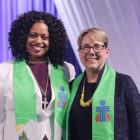
Presbyterian Church (USA) divests from the patriarchy
PORTLAND, Ore. (RNS) The 1.6-million member denomination will phase out all men from leadership by the year 2116.
[slingshot_ad name=”Slingshot Bottom Cube Ad”]




